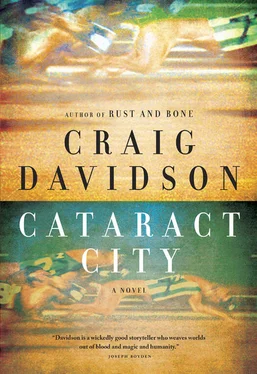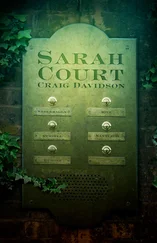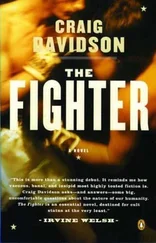“The Great Spirit has conveyed tremendous power into these vessels,” Silas would say, kissing each of his fists. “He told me, Go forth, Silas Garrow, and wreak great havoc on the white man and all their wicked ways .”
“The white man? Silas, all your fights were against Indians.”
“Yeah? Well, they had it coming. We all do.”
I’d tsk-tsk . “You’re such a racist.”
“I’m a self-hating Indian, man. Learn to spot the difference.”
We sparred four days a week, and the other three I nursed my various hurts. Black eyes and fat lips and a hematoma on my forehead big as a boiled egg, the blood wrapped tight as a fist under the skin. One day my guard stopped by my cell and whispered, “We can’t help unless you tell us who does this to you.”
I said, “I ran into a doorknob.”
“Suit yourself, hard guy.”
Sometimes, without quite admitting the instinct, I’d lean into one of Silas’s shots — Silas was a pitty-patter fighter anyway, no real gas in his pistons — and let his fist fillet my face. Once or twice he got an inkling about what I was doing; he’d cut a hard look at me, yank off his gloves and say, “The point of boxing is to not get hit.”
“Keep it coming, man. One more round.”
“You think I like kicking a dog down the street?”
“Come on. Give it to me like you mean it.”
One day Silas simply refused to go another round. “Listen, man … we’re all in here for good reason. Everybody’ll tell you it was a judge on the warpath or crooked cops, but facts sit square against that. The only sunlight I see is this one ray coming through my window in the morning — and man, I put my face to that ray, drink that shit up like Kool-Aid. We all owe and we’re all paying. But you don’t got to pay extra, okay? And if you’re bent on it, fine, but don’t go making me your fuckin’ Shylock.”
Silas won when we sparred because Silas was naturally gifted, but I picked up a few nifty new tricks. Every once in a while I’d catch him with a sweet hook to the short rib; the natural red would fall out of his face, to be replaced with puréed chalk.
Afterwards we’d sit on the apron, faces flushed and leather-burnt. Silas would tap me companionably on the back of the head with his glove. Sometimes his expression became solemn — or mock-solemn? I could never tell. “Can’t believe I’m actually friends with a paleface. This is going to fuck my cred all to shit if they ever find out on the rez.”
Edwina visited me only once, a month after I entered the pen.
She looked as beautiful as I’d ever seen her. Believe me when I say this had nothing to do with the fact that all I saw otherwise was the pitted faces of long cons. Hers was a raw beauty, and any changes I could spot were minor: she’d done a little something to her hair or her skin, imparting a fresh lustre.
We sat in the visiting room around circular steel tables that looked like playground carousels. Rays of sunlight carved through the barred windows — heatless in here, as always.
The other inmates snuggled with their wives and girlfriends like high-schoolers under the bleachers, copping feels just to touch flesh that had touched the outside world. Ed and I sat at opposite ends of the table. Ed’s hands stayed on her lap.
“You shithead,” she said flatly.
“I’m a shithead,” I agreed.
She fed quarters into the vending machines and came back with a Coke, a Diet Coke and a honey bun wrapped in cellophane. She slid the Coke and bun across to me.
“Was there a reason you didn’t tell me?”
“About what, Edwina?”
“About all of it.”
“What would you have done if I had told you?”
Edwina had the same hard-boned face as a lot of women in Cataract City, but the difference was in everything going on under that calm surface, nuances expressed in the smallest movements and dilations. I smiled; it was so good just to be this close to her, to see the gold coins of light dancing in each of her eyes.
“Jesus, Duncan. You killed a man.”
The finality with which she spoke those words — it was as if the act itself had attached itself to my name like a cocklebur. I was a killer. Not a murderer, but definitely a killer.
“Did you ever think?” She stared searchingly into my face. “I mean, in a million years …?”
“No, Ed. Never in a million years.”
“How did it happen?”
But this was almost like asking somebody how they’d come down with cancer: you accumulated bad habits and bad luck, I figured, and the next thing you know, something takes root. You don’t set out to get cancer. And I’d never set out to kill a man.
Ed exhaled heavily, blowing a bang slantwise across her forehead. I wanted to reach across the table and tuck that lock of hair behind her ear.
Later, I found a single strand of Ed’s hair in my cell, laid across my pillow like dark thread. I don’t know how it got there — I’d been stripped and scrubbed before entering the pen; everything I’d owned had been taken from me. And we hadn’t touched once during her visit; not a hug, not a handshake. But it was her hair. I knew this simply by feel, the way a man knows the shape of his wife’s body in the dark. A single strand of hair; all I had left of her. I held on to it for years, if you can believe it. I’d lie awake at night twining it around my finger, desperately afraid it’d snap. It never did — I was always gentle with it. If my orange jumpsuit had had pockets, I would’ve carried it close to me all day. But since pockets were banned, I slicked the hair with saliva and smoothed it to the metal frame of my cot in a spot where it wouldn’t be disturbed when the sheets were changed. It lasted three years, that strand of hair. Then one day I reached for it and it was gone. I hunted madly, making Bainbridge get up so I could search the floor under his cot, but no luck. Maybe it simply dissolved from all my handling.
Next Ed said, “Do you actually think I’ll wait?”
No, I knew she wouldn’t wait for me — not because there wasn’t any love between us, but because she’d freely given me the chance to save myself, and I hadn’t taken it. I couldn’t bear to consider her question, and so my mind fled back to the night when we’d first danced.
It happened months after we’d first held hands at Sherkston Shores. I’d asked her to dance on the postage stamp of a stage at the Wild Mushroom bar. The bond had been there in the curve of our bodies as we leaned into the music, heads cocked as we stared at each other. We’d danced to a Beatles song, “I Want to Hold Your Hand.” Ed held her hand out to me, her eyebrows raised in a silent question. I’d taken and kissed it, earning a round of desultory wolf-whistles from the rubber-necking barflies. Ed laughed and rolled her eyes. We’d danced to the next song, by the Tragically Hip, “Everytime You Go,” and I’d lip-synched the lines that ever since have been seared into my mind, meshed with the sight of Edwina’s hips swaying to the beat: My girl don’t just walk, she unfurls …
Afterwards we’d walked down Clifton Hill, which was nearly dark at that hour. Stars pinpricked the sky. We took sips from the can of Laker I’d cadged off the bartender at last call. We stood at the observation rail as water hit the cataract, sending up a mushroom cloud of spume. I’d slid my coat around her shoulders and told her about the things that had mattered to me back then: the motorcycle I’d planned to buy but never did, the cut on my hand I’d picked up on my first shift at the Bisk. She told me about the death of her father from esophageal cancer and the all-girl band she’d played in before getting into a fistfight with the lead singer.
Читать дальше












